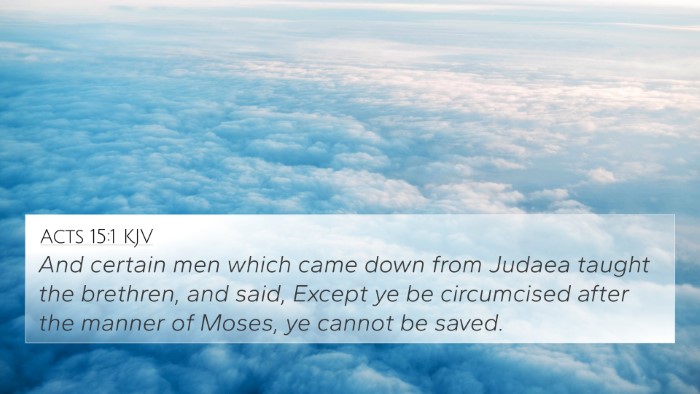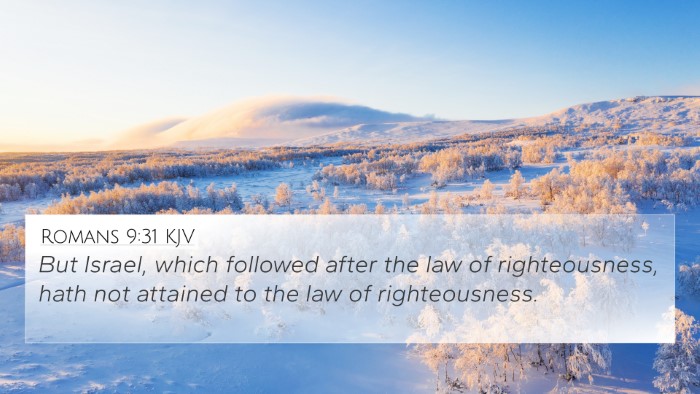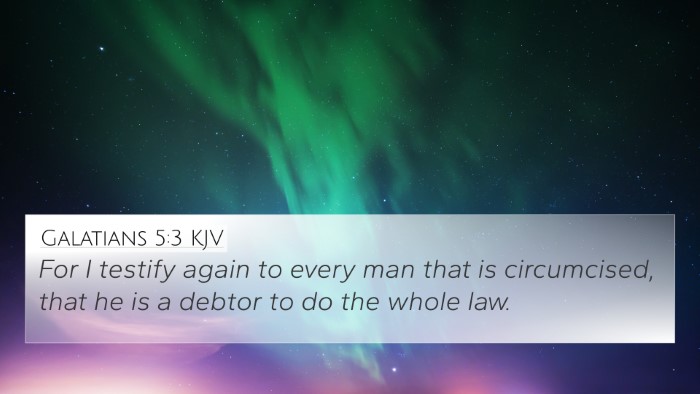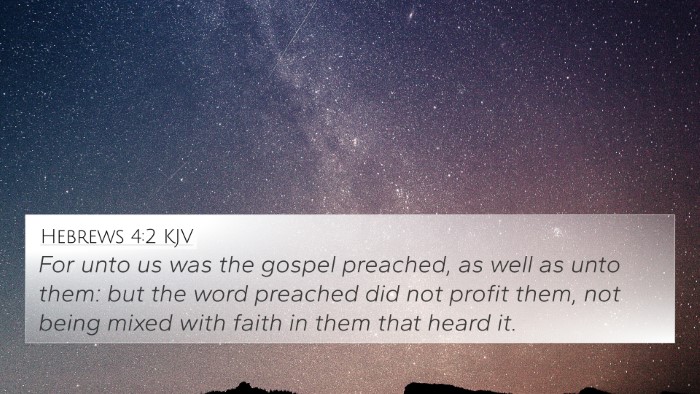Understanding Galatians 5:2
Verse: "Behold, I, Paul, say unto you, that if ye be circumcised, Christ shall profit you nothing." (Galatians 5:2)
Summary of Insights
This verse from Galatians addresses the critical issue of salvation and the law. The Apostle Paul emphasizes that relying on the law, symbolized by circumcision, renders the grace of Christ ineffective in achieving salvation.
Commentary Insights
Matthew Henry's Commentary
Henry posits that Paul is cautioning the Galatians against adopting the Jewish practices that distinguish them from Gentile believers. He highlights that justification comes through faith in Christ, not through adhering to the law. Paul’s tone is urgent, as he wishes to convey that embracing circumcision equals denying the sufficiency of Christ’s sacrifice.
Albert Barnes' Notes
Barnes expands on the theological implications of this verse, suggesting that Paul is making a case about the futility of mixing faith with works for justification. He explains that if one relies on faith plus works (in this case, the act of circumcision), it negates the cleansing power of Christ's sacrifice. The confidence should solely rest in Christ's redemptive work rather than any ceremonial law.
Adam Clarke's Commentary
Clarke points out that Paul’s declaration is not an attack on circumcision itself but on the necessity of its observance for salvation. He implies that introducing such legal requirements dilutes the core message of the Gospel. Clarke articulates that true Christianity exalts faith alone, which is comprehensive and inclusive, negating the efficacy of rituals in attaining grace.
Bible Cross-References
To fully appreciate the implications of Galatians 5:2, it’s helpful to consider the following cross-references:
- Romans 3:28: "Therefore we conclude that a man is justified by faith without the deeds of the law." (Identifies justification through faith alone.)
- Galatians 2:21: "I do not frustrate the grace of God: for if righteousness come by the law, then Christ is dead in vain." (Emphasizes the sufficiency of grace.)
- Ephesians 2:8-9: "For by grace are ye saved through faith; and that not of yourselves: it is the gift of God: Not of works, lest any man should boast." (Reinforces grace over works.)
- Philippians 3:3: "For we are the circumcision, which worship God in the spirit, and rejoice in Christ Jesus, and have no confidence in the flesh." (Contrasts true worship vs. ritualistic practices.)
- Hebrews 10:14: "For by one offering he hath perfected for ever them that are sanctified." (Affirms Christ's singular sacrifice.)
- Colossians 2:14: "Blotting out the handwriting of ordinances that was against us, which was contrary to us, and took it out of the way, nailing it to his cross." (Describes the abolition of the law’s demand.)
- 1 Corinthians 1:17: "For Christ sent me not to baptize, but to preach the gospel: not with wisdom of words, lest the cross of Christ should be made of none effect." (Mentions reliance on the Gospel over ritual practices.)
Thematic Connections
This verse is pivotal in discussions regarding the themes of liberty in Christ versus legalism. It highlights the conflict between faith and works, and the sufficiency of Christ’s sacrifice for salvation. Below are some broader themes connected to this passage:
- Grace vs. Law: The continuous battle of relying on God's grace instead of adhering to the law as a means of salvation.
- Faith Alone: The central tenet of salvation that emphasizes belief in Christ without the circumstantial claims of law.
- Spiritual Freedom: Understanding that true faith in Christ liberates us from the shackles of ritualistic practices.
Conclusion
Galatians 5:2 encapsulates a fundamental truth concerning the Christian faith: that salvation is found in Christ alone and not through the mere observance of religious rituals. Through insights drawn from public domain commentaries and cross-referenced with other scriptural passages, one can see how this verse not only conveys Paul's urgent message but also serves as a staple for understanding faith within the context of grace.
Further Study
To enhance your understanding, consider utilizing tools for Bible cross-referencing, such as a bible concordance or a bible cross-reference guide. This will help you explore thematic connections, such as identifying connections between the Old and New Testament, and engaging in comparative studies of Pauline epistles.
















